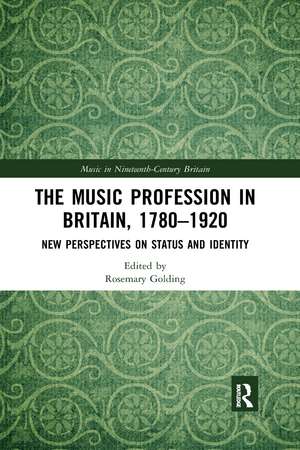The Music Profession in Britain, 1780-1920: New Perspectives on Status and Identity: Music in Nineteenth-Century Britain
Editat de Rosemary Goldingen Limba Engleză Paperback – 30 iun 2020
| Toate formatele și edițiile | Preț | Express |
|---|---|---|
| Paperback (1) | 382.95 lei 6-8 săpt. | |
| Taylor & Francis – 30 iun 2020 | 382.95 lei 6-8 săpt. | |
| Hardback (1) | 1055.51 lei 6-8 săpt. | |
| Taylor & Francis – 28 mar 2018 | 1055.51 lei 6-8 săpt. |
Din seria Music in Nineteenth-Century Britain
-
 Preț: 185.59 lei
Preț: 185.59 lei - 9%
 Preț: 934.96 lei
Preț: 934.96 lei -
 Preț: 330.20 lei
Preț: 330.20 lei -
 Preț: 469.34 lei
Preț: 469.34 lei -
 Preț: 489.26 lei
Preț: 489.26 lei - 18%
 Preț: 1057.89 lei
Preț: 1057.89 lei - 18%
 Preț: 1002.63 lei
Preț: 1002.63 lei -
 Preț: 469.34 lei
Preț: 469.34 lei -
 Preț: 469.34 lei
Preț: 469.34 lei -
 Preț: 469.34 lei
Preț: 469.34 lei -
 Preț: 469.34 lei
Preț: 469.34 lei - 18%
 Preț: 1005.80 lei
Preț: 1005.80 lei -
 Preț: 469.34 lei
Preț: 469.34 lei - 17%
 Preț: 338.33 lei
Preț: 338.33 lei - 31%
 Preț: 764.62 lei
Preț: 764.62 lei -
 Preț: 469.34 lei
Preț: 469.34 lei -
 Preț: 436.14 lei
Preț: 436.14 lei - 25%
 Preț: 823.99 lei
Preț: 823.99 lei - 18%
 Preț: 1061.06 lei
Preț: 1061.06 lei -
 Preț: 489.26 lei
Preț: 489.26 lei - 18%
 Preț: 1063.73 lei
Preț: 1063.73 lei - 26%
 Preț: 850.99 lei
Preț: 850.99 lei -
 Preț: 469.34 lei
Preț: 469.34 lei -
 Preț: 469.34 lei
Preț: 469.34 lei - 13%
 Preț: 338.33 lei
Preț: 338.33 lei - 17%
 Preț: 338.33 lei
Preț: 338.33 lei - 18%
 Preț: 1015.26 lei
Preț: 1015.26 lei -
 Preț: 469.34 lei
Preț: 469.34 lei - 18%
 Preț: 1058.38 lei
Preț: 1058.38 lei - 30%
 Preț: 769.55 lei
Preț: 769.55 lei - 18%
 Preț: 1114.70 lei
Preț: 1114.70 lei - 18%
 Preț: 1062.62 lei
Preț: 1062.62 lei - 18%
 Preț: 1061.06 lei
Preț: 1061.06 lei
Preț: 382.95 lei
Nou
Puncte Express: 574
Preț estimativ în valută:
73.30€ • 79.65$ • 61.61£
73.30€ • 79.65$ • 61.61£
Carte tipărită la comandă
Livrare economică 21 aprilie-05 mai
Preluare comenzi: 021 569.72.76
Specificații
ISBN-13: 9780367591939
ISBN-10: 0367591936
Pagini: 242
Dimensiuni: 156 x 234 x 13 mm
Greutate: 0.3 kg
Ediția:1
Editura: Taylor & Francis
Colecția Routledge
Seria Music in Nineteenth-Century Britain
Locul publicării:Oxford, United Kingdom
ISBN-10: 0367591936
Pagini: 242
Dimensiuni: 156 x 234 x 13 mm
Greutate: 0.3 kg
Ediția:1
Editura: Taylor & Francis
Colecția Routledge
Seria Music in Nineteenth-Century Britain
Locul publicării:Oxford, United Kingdom
Cuprins
Introduction Rosemary Golding
1. The Finances, Estates, and Social Status of Musicians in the Late Eighteenth Century Rebecca Gribble
2. Composers and Publishers in Clementi’s London David Rowland
3. Professionalization and the Female Musician in Early Victorian Britain: the Campaign for Eliza Salmon David Kennerley
4. The British Army and the Music Profession: the Impact of Regimental Bands on the Status and Identity of Professional Musicians Helen Barlow
5. Church Musicians in Nineteenth-Century Durham Martin V. Clarke
6. The Rise of the Professional Music Critic in Nineteenth-Century England Paul Watt
7. Music Teaching in the Late-Nineteenth Century: a Professional Occupation? Rosemary Golding
8. Women Musicians and Professionalism in the Late-Nineteenth and Early-Twentieth Centuries Sophie Fuller
9. Musicians, Singers and Other Artistes as Workers in the British Music Hall 1900-1918 John Mullen
10. Building a Concert Career in Edwardian London Simon McVeigh
1. The Finances, Estates, and Social Status of Musicians in the Late Eighteenth Century Rebecca Gribble
2. Composers and Publishers in Clementi’s London David Rowland
3. Professionalization and the Female Musician in Early Victorian Britain: the Campaign for Eliza Salmon David Kennerley
4. The British Army and the Music Profession: the Impact of Regimental Bands on the Status and Identity of Professional Musicians Helen Barlow
5. Church Musicians in Nineteenth-Century Durham Martin V. Clarke
6. The Rise of the Professional Music Critic in Nineteenth-Century England Paul Watt
7. Music Teaching in the Late-Nineteenth Century: a Professional Occupation? Rosemary Golding
8. Women Musicians and Professionalism in the Late-Nineteenth and Early-Twentieth Centuries Sophie Fuller
9. Musicians, Singers and Other Artistes as Workers in the British Music Hall 1900-1918 John Mullen
10. Building a Concert Career in Edwardian London Simon McVeigh
Notă biografică
Rosemary Golding is a staff tutor and senior lecturer in Music at the Open University. She has published on the history of music as an academic subject in nineteenth-century Britain as well as institutional and professional identities in music. Current research interests also include the relationship between music and health in nineteenth-century Britain, with a particular focus on the uses of music in lunatic asylums.
Descriere
Professionalisation was a key feature of the changing nature of work and society in the nineteenth century, with formal accreditation, registration and organisation becoming increasingly common. Contributors investigate the ways in which musicians viewed their own identities, public perceptions of the working musician, the statuses of diffe
